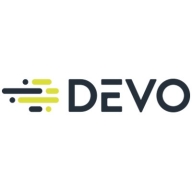

Devo and Palantir Foundry are competitors in the data analytics and integration software market. While both offer robust solutions, Devo holds an edge with its cloud-first architecture and real-time analytics specifically tailored for security operations.
Features: Devo offers advanced Activeboards, real-time analytics, and a seamless multi-tenant environment, providing advantages in security operations. Its cloud-first architecture ensures scalability and efficiency, while extended log retention enhances data management. Palantir Foundry excels in data integration and transformation with strong visualization capabilities and an end-to-end tech stack encompassing robust plugin connectors and comprehensive data lineage.
Room for Improvement: Devo can improve AI capabilities, customize features better, and address pricing unpredictability. Enhancements are also needed in browser-based searches and support for third-party integrations. Meanwhile, Palantir Foundry could benefit from simplifying its setup process and enhancing front-end capabilities. Better online documentation and cost efficiency would be advantageous as well.
Ease of Deployment and Customer Service: Devo provides flexibility with various deployment options, including hybrid cloud and on-premises, while striving for responsive customer service. However, users have pointed out the need for more technical support responsiveness. Palantir Foundry focuses on public cloud deployments and prioritizes customer support, though it can improve its escalation process.
Pricing and ROI: Devo's pricing model based on data ingestion, though potentially leading to higher costs, offers budgeting predictability, and users appreciate its infrastructure cost savings. Palantir Foundry's pricing is perceived as high, but the value from its integration capabilities can justify the expense. Both aim to optimize ROI by reducing mean time to remediation, with Devo's model offering notable flexibility and cost benefits for different organization sizes.
| Product | Market Share (%) |
|---|---|
| Palantir Foundry | 4.3% |
| Devo | 4.8% |
| Other | 90.9% |


| Company Size | Count |
|---|---|
| Small Business | 8 |
| Midsize Enterprise | 4 |
| Large Enterprise | 11 |
| Company Size | Count |
|---|---|
| Small Business | 4 |
| Midsize Enterprise | 5 |
| Large Enterprise | 8 |
Devo is the only cloud-native logging and security analytics platform that releases the full potential of all your data to empower bold, confident action when it matters most. Only the Devo platform delivers the powerful combination of real-time visibility, high-performance analytics, scalability, multitenancy, and low TCO crucial for monitoring and securing business operations as enterprises accelerate their shift to the cloud.
Palantir Foundry is an enterprise data management platform offering comprehensive tooling for working with big data. Because it is an operating system made for modern enterprises, it is highly available and a continuously updated platform.
Palantir Foundry is a fully managed SaaS platform that spans from cloud hosting and data integration to flexible analytics, visualization, model-building, operational decision-making, and decision capture. It equips technical and non-technical users to make data-driven operational decisions.
Palantir Foundry includes tools to integrate data of any scale, format, or structure, and also has granular, flexible access controls for individual datasets. In addition, it has an open, modular architecture with multiple RESTful APIs, it has native applications for developing machine learning and artificial intelligence, it provides sophisticated data science applications for users of all technical abilities, and much more.
Palantir Foundry Features
The most valuable Palantir Foundry features include:
Security, flexibility, interoperability, easy deployment, built-in role classification, purpose-based access controls, interoperable architecture, model integration, AI modeling tools, ontology, custom workflows, team-specific applications, self-serve analytics, lineage system, operational application building, 200+ data connectors, data versioning, change management framework, sand decision orchestration, and custom dashboard and report building tools.
With Palantir Foundry You Can:
Palantir Foundry Benefits
Some of the many Palantir Foundry benefits include:
Reviews from Real Users
PeerSpot users like Palantir Foundry because it has many advantages:
“It is user-friendly, good automation, and allows you to do a better job of data governance.” - Associate, Inhouse Consulting at a pharma/biotech company
“Works seamlessly with good end-to-end capabilities and the capability to scale.” - Wallace H., Sr. Director at a tech services company
We monitor all IT Operations Analytics reviews to prevent fraudulent reviews and keep review quality high. We do not post reviews by company employees or direct competitors. We validate each review for authenticity via cross-reference with LinkedIn, and personal follow-up with the reviewer when necessary.